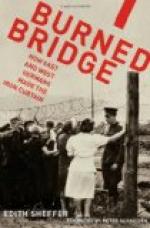THOMPSON’S RETURN
“Anon we return, being gathered again
Across the sad valleys all drabbled with rain.”
On an evening near the first of September, 1918, a Canadian Pacific train rumbled into Vancouver over tracks flanked on one side by wharves and on the other by rows of drab warehouses. It rolled, bell clanging imperiously, with decreasing momentum until it came to a shuddering halt beside the depot that rises like a great, brown mausoleum at the foot of a hill on which the city sits looking on the harbor waters below.
Upon the long, shed-roofed platform were gathered the fortunate few whose men were on that train. Behind these waited committees of welcome for stray dogs of war who had no kin. The environs of the depot proper and a great overhead bridge, which led traffic of foot and wheel from the streets to the docks, high over the railway yards, were cluttered with humanity that cheered loudly at the first dribble of khaki from the train below.
It was not a troop train, merely the regular express from the East. But it bore a hundred returned men, and news of their coming had been widely heralded. So the wives and sweethearts, the committees, and the curious, facile-minded crowd, were there to greet these veterans who were mostly the unfortunates of war, armless, legless men, halt and lame, gassed and shrapnel-scarred—and some who bore no visible sign only the white face and burning eyes of men who had met horror and walked with it and suffered yet from the sight. All the wounds of the war are not solely of the flesh, as many a man can testify.
From one coach there alighted a youngish man in the uniform of the Royal Flying Corps. He carried a black bag. He walked a little stiffly. Beyond that he bore no outward trace of disablement. His step and manner suggested no weakness. One had to look close to discern pallor and a peculiar roving habit of the eyes, a queer tensity of the body. A neurologist, versed in the by-products of war, could have made a fair guess at this man’s medical-history sheet. But the folk on the platform that night were not specialists in subtle diagnosis of the nervous system. Nor were the committees. They were male and female of those who had done their bit at home, were doing it now, welcoming their broken heroes. The sight of a man with a scarred face, a mutilated limb, elicited their superficial sympathy, while the hidden sickness of racked nerves in an unmaimed body they simply could not grasp.
So this man with the black bag and the wings on his left arm walked the length of the platform, gained the steel stairway which led to the main floor of the depot, and when he had climbed half-way stopped to rest and to look down over the rail.
Below, the mass of humanity was gravitating into little groups here and there about a khaki center. There was laughter, and shrill voices, with an occasional hysterical note. There were men surrounded by women and children, and there were others by twos and threes and singly who looked enviously at these little groups of the reunited, men who moved haltingly on their way to the city above, perfunctorily greeted, perfunctorily handshaken, and perfunctorily smiled upon by the official welcomers.




